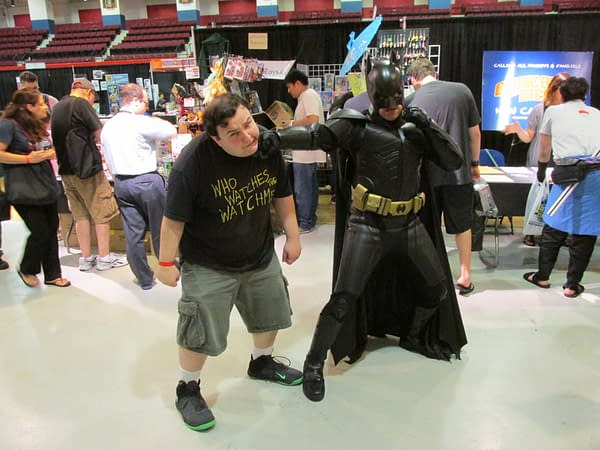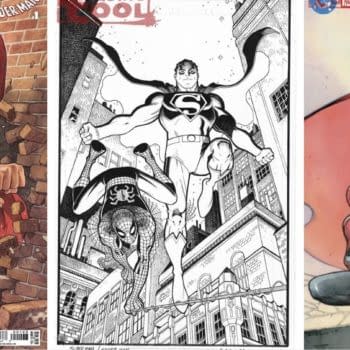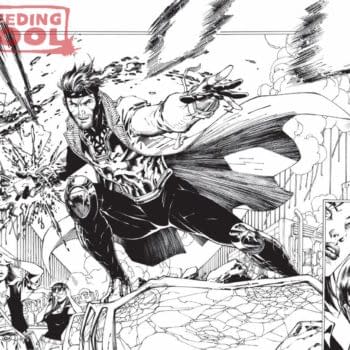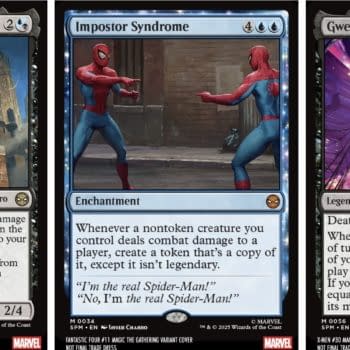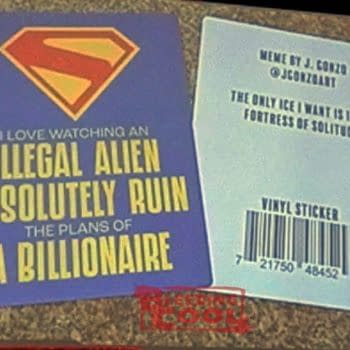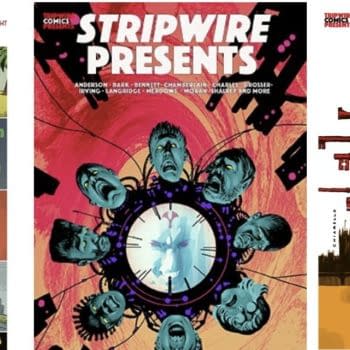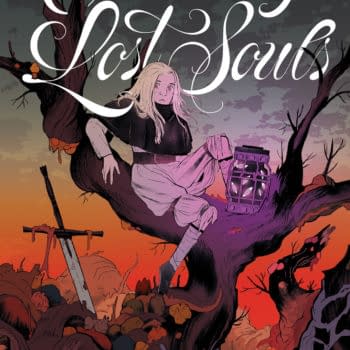Posted in: Comics, Recent Updates | Tagged: Batman, Batman's 75th Anniversary, bill finger, bob kane, Comics, court of owls, Dan Greenfield, denny o'neil, Dick Giordano, entertainment, frank miller, greg capullo, Jenette Kahn, Julie Scwartz, New York Comic Fest, Paul Levitz, scott snyder
Batman Felt 'Creator-Owned In That Moment' – Scott Snyder, Denny O'Neil, And Paul Levitz Celebrate 75 Years At The New York Comic Fest
In a panel that could have easily been called "Batman: Generations" celebrating the 75th Anniversary of the Caped Crusader's influence on the world at the New York Comic Fest in White Plains, New York on Saturday, many of New York's great and good as well as a triple-sized panel room full of fans turned out to pay their tribute. And the panel's guests were those who know whereof they speak on a deep, personal, level, having worked alongside Batman in a way that tremendously impacted their own lives. Dan Greenfield of the 13th Dimension hosted the panel including longtime Batman editor and general champion of organizing and recording the legacy of DC Comics, Paul Levitz, Batman editor, writer, and living legend Denny O'Neil, and Batman's most recent custodian and superfan, writer Scott Snyder.
The panel was a time for storytelling, and pointing out much of the historical context that is much needed to really perceive Batman's place in pop culture, and the overall theme seemed to be "evolution", allowing change, and often championing it as a way to keep Batman stories vital and relevant while maintaining a character and world core that prevents the property from drifting away from his appeal and his strengths.
Greenfield asked the panelists, initially, "How did you come to the character of Batman and what makes him endure?"
Levitz said, "I came in at the low point in Batman's existence". He started reading comics at end of Jack Schiff edited era with stories like "Robin Dies at Dawn" and described many of the stories he read at the age of 6-7 years old as "Batman fights aliens from another planet who looks just like the aliens from the issue before". Because of that he became "more of a Superman kid", but when Julie Schwartz took over the book, the art started getting "better". He recalls that he acquired his first issue as a premium in a restaurant, designed "to keep kids quiet", at which point he started reading again. "I've not had him out of my life ever since", he said.
Snyder reflected, "Batman has always been my favorite. I used to race home and watch it on TV and didn't realize the series was campy. Shark repellent was a real thing to me". Snyder feels that Batman "grew up" as he grew up since when he was 9 years old, The Dark Knight Returns came out. Snyder used to get to go to Forbidden Planet in New York in its 2 locations with his father and his friend and TDKR "changed the way I saw comics and writing and made me want to write", he said. "It was so intensely personal and visionary and different and made Batman so pathological", he explained, and led him to the "understanding that you can take a superhero character and make him that elastic. That you can make it about your own demons and not betray the essence of the character". "I was that age where suddenly it was 'talking up to me'", Snyder explained.
O'Neil started reading Batman comics at 5 or 6 years old, the "better part of a century ago", he laughed. After attending mass, his family would stop for "confectionaries" at a small shop and he'd get a comic. "I was beginning to understand that I wanted to read", he said, but it was entertainment, and he not "discriminating". When he discovered that other kids read comics and were willing to trade, an "anti mylar bag" process, he realized that for a 10 cent investment, he would get to read 20 comic books. "I think probably I learned to read from comics more from Dick and Jane", he said, but as for his later professional life, he commented "It was a job. We were pretty disreputable", and laughed along with the audience.

Giordano introduced O'Neil to Julie Schwartz, and at the time, O'Neil says, he was a "long-haired Hippie meeting guy in suit", but it was the beginning of the"most satisfying professional relationship I'd ever had", he said. After the Batman '66 TV show "folded because it was campy", O'Neil was asked to take Batman in a different direction. Schwartz said, "My boy, what have you got?" and the only thing he could think of was to "take it back to the beginning", and ask himself, "What did Bob Kane and Bill Finger start with?", but he also had a concern to "add to that the expertise of language of comics as it had developed" over time.
O'Neil read the early stories and "found what we did was to go back to what was implicit. By 1945, Batman was a cop, by the 50's, he was Gotham City's leading citizen". O'Neil knew that writing about a character like Superman would never work for him, but Batman would. He said, "Write about what you know, and this has to do with our fantasies. There are guys who fantasize omnipotence, but those are not my fantasies. From a practical standpoint, the basis of this kind of fiction is conflict. How do you create a conflict with such a character [as Superman] without stopping to explain why he didn't use power he used last month— that is sloppy writing. Finding Superman was difficult but finding Batman was something fun".

When Levitz entered comics professionally, he said, "You could literally sit there and read every Batman story that had been done", so when he was hired to edit Batman, he created a "5 or 6 page Bible" after his library read. It was the "first time in DC's history that one editor was handling all the Batman books, and the first time a DC editor had put together anything resembling a Bible for the character". It was a way of saying "we're going to fit all the pieces together" for Levitz, working to create the "same Batman in all the books". 'That was the most virtuous thing I brought to it", Levitz concluded regarding his contribution to the mythos.
Levitz explained the context for this decision that may strike us as odd nowadays. "One of the things that's changed in a fascinating way over the years", he said, is that "when comics started, no one really looked for a way for comics to fit together. My generation, with guys like Mark Gruenwald, a small group of people, started to care about how things fit together. We've now swung to a new point where the sophistication of the audience means that there's comfort with the "folkloric quality" about Batman and we can have different story types as long as they are "true to essence" in parallel versions".
Greenfield asked the panelists what kind of pressure they face as writers in terms of keeping continuity for Batman and Snyder was quite open about the difficulties he faces: "Well, it's terrifying. I almost quit when I got the job. I was writing backups, then when they called up, I thought I was getting fired". They told him that a feature had opened, "all of Detective". "I think I'm just going to call in sick", he told his wife after getting home and thinking it over. Snyder's trepidation is based on awareness of influence and continuity. "So many of the stories that have come before were transformative for me as a writer that mean a lot to me", he explained, " They mean as much to me as any book or movie. For me, Batman casts the longest shadow. It's always terrifying. Every time we start a new arc, I'm terrified". Snyder is very candid that he's "always had problems with anxiety", but that artist Greg Capullo's attitude helps a great deal. He routinely gives a "Drop it. We're doing it", pep talk in response to Snyder's ideas.
The legacy of the stories looms large for Snyder, including the work of O'Neill, and Frank Miller. They made him "realize that the stories can be intensely personal". Snyder grew up on the lower East Side in New York, not allowed to go to Times Square, because there was too much graffiti and crime. He feels you can "see that world in Batman: Year One". Now the city has changed so much, and is so different, but for Snyder, "To see Batman walking the streets that you knew and where you were warned about street criminals" channels his childhood.
He said that he finally got to meet Frank Miller for the first time the other night, and the "thing that makes him and that work so important" is that he rendered Batman "modern and immediate". Miller's work felt "creator-owned in that moment", inspiring Snyder. He finds himself trying to do the same in Batman: Zero Year 2, making the story "intensely personal and modern", drawing on our "fears". It's the "greatest challenge there is", he said, "if you can flip that fear as a writer", knowing you'll never be as good as your previous writing heroes, but "turn it into inspiration" and work "in the spirit of that". If Snyder can do that, I can "kind of get over it", he said.
Greenfield asked about the development of Batman in the 1980's and O'Neil "wanted to comment that without the Detective #33 origin story we wouldn't have done what we did. We owe every thing to Bill Finger and Bob Kane. Without that origin story, we wouldn't have taken it where we did". He started in comics because he had to, not because he had self-confidence. He was a "rebel and a Hippie with no future, so comics were perfect at the time for him. "It wasn't supposed to be good. It was just supposed to be Thursday", he said to more amusement from the audience. "For us, second generation comic book writers", he said, "We respect it as an art form, but treat it as a job".
Levitz agreed that in the 80's Batman was certainly not a "flagship title". The book was qualifying for that Thursday rule, "with competent professional work, and talented people, but there was no passion and there was no ground being broken". It was "not any better or different than other stuff being done", he commented, but "when Denny came in, there was the combination that comics were changing, with comic shops as a central market, and Denny was also a deep thinker about Batman, and someone who was utterly willing to screw with the formula".
O'Neil followed on by saying, "The times they were a'changing. The old guys had been doing this for 20 years and it worked. It met the parameters of the job". He recalls a writer saying to him, as editor once, "I'm doing the Batman you did 20 years ago", and he replied, "Yeah, but I'm not". From an editorial standpoint, these characters have evolved, he said. At age 6, O'Neil said, he liked those early stories, but "if you were publishing that today, we'd be having this convention in a phone booth" due to few takers. When Frank Miller told him about Year One, he thought "This would do what I want to do. It would send a message to readers that 'this is not your father's Batman'". He realized that if he was allowed to serialize it first, Miller and his team would be taken care of financially, then get the hardcover and the plan was "dead on".
When Greenfield asked what the panelists have been most proud of in Batman's development, it gave them all pause because of so many things they take satisfaction in. For Levitz, being involved as an adviser to Chris Nolan on his film trilogy stands out, having a "back and forth in many conversations", including Saturday morning random calls about terminology to use.
Snyder said that as a writer, it's very hard to pick a favorite and the answer is always 'the next one'. "Actually, I kind of think it might be", he laughed, referring to the new arc starting in October. "Each issue has very personal aspects of fandom for the character and also your own experience", he said. Doing Court of Owls came about from Snyder growing up in the city, and realizing "no matter how well you knew neighborhood, you couldn't know the lives there before you". Considering that in New York, "neighborhoods are there for a short time and then gone" led to the sense of Batman knowing Gotham, but asking "What if a city always unknowable and mysterious?"
Writing Death in the Family also drew on Snyder's own life, addressing the Joker, allies, and younger family members, because his wife was pregnant with their second kid, and he asked himself, "How do I worry about both?" It made him realize that "Batman must wish he could stop worrying about his extended family", and it's as if the Joker might be able to grasp that insecurity and say "I just heard you wish that your family was dead". Zero Year 2 will approach "Young Bruce in a different way", he said, and "show tough things were on him, and his mental health following his parents' death", so they'll be "doing something a little different there".
O'Neil also experienced the impact of working on Batman very personally, and "found himself running around Washington Square Park at 2AM in a rainstorm coming to terms with the fact" that he was never going to do Batman again. "You can't help but have an emotional investment", he said, and "You have to remember it's a responsible job. If various people don't do their job on time, they have no right to do that. But somewhere deep inside, we knew this was an artform", something he learned from Will Eisner.
Greenfield asked if the panelists could comment on how the famous "Death of Robin" and the phone poll incident really played out., when a number to call in was printed in a comic book to vote whether would Robin live or die. "There was no Bleeding Cool back then to leak the information", Greenfield quipped.
O'Neil said it's hard to recover the exact facts after so much time as passed but gave his version to the best of his knowledge. "This is the way I remember it", he said. After a retreat, he and Jenette Kahn "were wool-gathering waiting for our ride, staring out the window. We knew that Robin was a problem. Jerry Conway had recreated Robin as a clone of Dick Grayson, but somehow or other, he had become a little snot. What do we do? Write him out?", they wondered.
O'Neil doesn't know if it was he or Kahn, but one of us said "Let's let the readers decide", and they both came up with "telephone stunt". They went through a process with their writers to make it work and couldn't have people who did not buy comics at comic shops participate as well as needing to do it in 3 days with the restriction that the phone company wouldn't let them use the words "die" or "death".
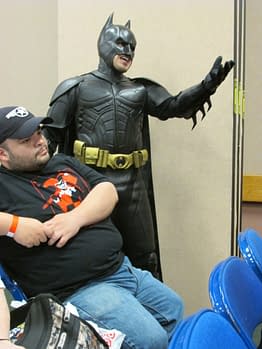
Snyder recalls the phone-in event vividly, since he was at a playground, putting 50 cents into a payphone, voting for Robin's death, and then feeling bad, so he went back to vote again.
There wasn't an extensive amount of time for questions after the panel, but the first was a meaty one. A fan asked that given there's a whole generation of Batman fans growing up "thinking the movie is the Bible" and arguing about it, does it seem like this generation doesn't appreciate the contributions that people like O'Neil, Levitz, and Snyder have made?
Snyder said, "I think the fun of it is that for me, I grew up in a time when continuity was very important to me, but as a writer, there's a dichotomy and you want to be able to do stories that exist outside of continuity. I feel oddly ok seeing different versions on multiple platforms and they are real to me in different ways. You create your own version. Early on, it's an amalgam of your favorite versions, but over time you realize it begins and ends with you, which is wonderful and scary, that it's your character who belongs to everybody. I'm always first in line to see how someone else does it. It's fascinating to watch if someone does it in a way that's personal and their own".
O'Neil agreed that Snyder's observations were "true as long as you're maintaining storytelling discipline. The problem is when you can't tell what's going on. If you're doing a 2000 word continuity, work out the story beats. If you don't do that, fans are confused and a writer should "owe some debt to the craft of fiction".
Related to that, an audience member asked if it makes a difference if readers have come to appreciate Batman at a young age or later in life. Levitz said, "We sat around for years wondering what would happen to comics if little kids weren't reading them. But the industry didn't end, it changed and morphed, and many people are coming into comics at an older age, but they are not necessarily coming to Batman as a character at an older age, since there are animated versions. As long as people are still falling in love with the characters I care about, I'm thrilled, because it's keeping them alive in the world. It's an amazing thing sitting here 75 years later and seeing that you all care. None of these guys expected you to know this 75 years after they did this work. No one would have bet a nickel that 10 years after they did those stories anyone would give a damn".
O'Neil added that there are "five or six different versions of Batman, from playboy to possibly "committing homicide these days?"[A question which he directed as Snyder teasingly, but Snyder assured him otherwise]. None are "wrong", O'Neil said, but "all are appropriate to a time and a place. Yeah, that is Batman. The reason this character survived and prospered is that he has been allowed to evolve. There is such a thing as evolution". O'Neil commented, in comparison that modern takes on the Shadow have not been as successful because the character did not evolve in the same way. Likewise Doc Savage.
In closing, Snyder fielded a number of questions, including why he only scripts for one Batgirl at a time. " I don't know, I'd be up for Batgirls", he smiled, and when someone asked if the panelists had seen the "Batfleck suit" and who their dream actor would be for the job, Snyder brought the house down by shouting, "Me!" As Snyder clearly reveals in this statement, the other panelists too, are the ultimate superfans of Batman, and that has meant allowing him to evolve and multiply in ways appropriate to our times and our concerns. And that has brought us 75 years of Batman, and hopefully will bring us at least 75 more.
And here's our mostly-complete audio recording of the panel, which starts at about 5 minutes into the discussion (apologies):
Hannah Means-Shannon is EIC at Bleeding Cool and @hannahmenzies on Twitter





